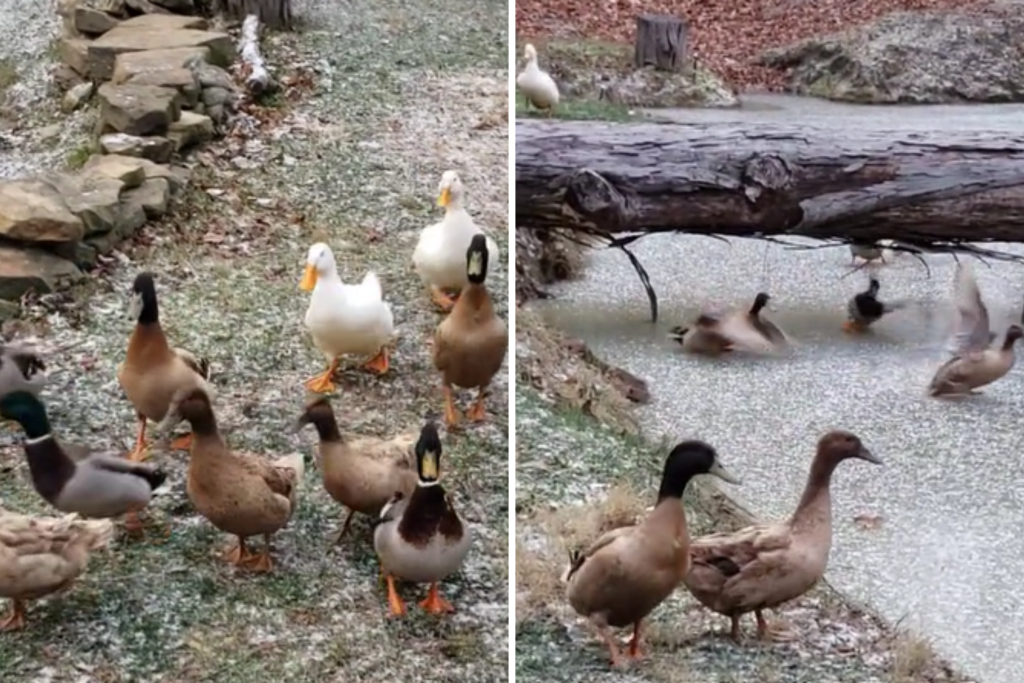The onset of winter brought an unexpected and comical surprise for a flock of ducks in Washington, Pennsylvania. Mary Grace Locy and her husband, Jon, caretakers of the flock, witnessed a charmingly bewildered reaction from their feathered friends when the ducks encountered a frozen pond for the first time. Having raised the ducks from chicks, the Locys had established a close bond with the birds, making their pond-side home a beloved part of their 11-acre property. The pond, a collaborative project built by Mary Grace and Jon, held a special place in Mary Grace’s heart, serving as a tranquil haven for the ducks. This previously serene spot became the stage for an amusing spectacle when the first winter frost transformed the pond’s surface into a sheet of ice.
Anticipating an interesting reaction, Mary Grace decided to film the ducks’ encounter with the unfamiliar frozen surface. Unsure of how the change-averse birds would respond, she was surprised to see Daisy, one of the ducks, boldly venture onto the ice. The rest of the flock, demonstrating their tight-knit bond, followed Daisy in what appeared to be a concerned rescue mission. The ducks’ initial foray onto the ice was marked by comical slips and slides as they navigated the unfamiliar terrain.
Mary Grace captured the hilarious moment and shared it on TikTok, where it quickly went viral, amassing over 5 million views. The video, narrated by Mary Grace, documented the ducks’ initial hesitation before Daisy’s intrepid first step onto the ice. The subsequent waddling and bewildered expressions of the flock, coupled with their eventual, seemingly indignant retreat, resonated with viewers around the world. Many commented on the comical nature of the situation, comparing the ducks’ hurried return to a customer filing a complaint.
The video’s unexpected popularity surprised Mary Grace, who initially intended it for a private viewing with her husband. The overwhelming response, filled with humorous interpretations and expressions of delight, highlighted the universality of the ducks’ relatable reaction to the unexpected change in their environment. Commenters joked about the ducks “cussing” at Mary Grace for not warning them about the ice and marvelled at the sight of ducks seemingly “ice skating”. The playful banter and widespread enjoyment of the video demonstrated the power of simple moments of animal behavior to connect with a global audience.
Beyond the humor, the video also provided insight into the ducks’ social dynamics and their adaptation to the changing environment. Daisy’s initial bravery, followed by the flock’s supportive, albeit clumsy, response showcased their close-knit community. The incident also revealed their initial apprehension towards the unfamiliar ice, which Mary Grace later confirmed they had since overcome. The ducks learned from their initial icy encounter, now cautiously checking the pond’s surface before venturing onto it.
The Locys’ care for their feathered friends extended beyond providing a pond. Addressing concerns about the ducks’ winter water access, Mary Grace explained their thoughtful provision of a year-round fresh water source. A nearby spring, overflowing into a bathtub, ensured the ducks could swim and drink even during freezing temperatures. Surprisingly, Mary Grace revealed the ducks sometimes preferred this alternative water source even during summer months. This detail underlined the Locys’ commitment to the ducks’ well-being and their understanding of the animals’ preferences.
The story of the ice-surprised ducks provides a heartwarming example of the joy and amusement that animals can bring into our lives. The Locys’ loving care for their ducks, coupled with the birds’ charmingly bewildered reaction to the frozen pond, created a moment of levity that resonated with millions. The story also underscores the importance of observing and appreciating the nuances of animal behavior, revealing the surprising depth of their interactions and adaptations to the world around them. The ducks’ initial confusion, their subsequent adaptation, and the Locys’ proactive care illustrate a harmonious coexistence between humans and animals, where even unexpected challenges can lead to moments of connection and amusement.










